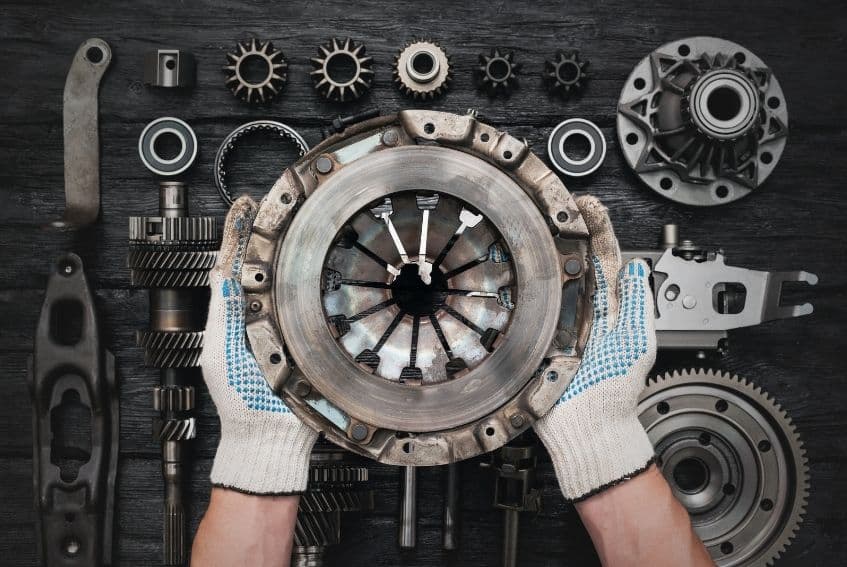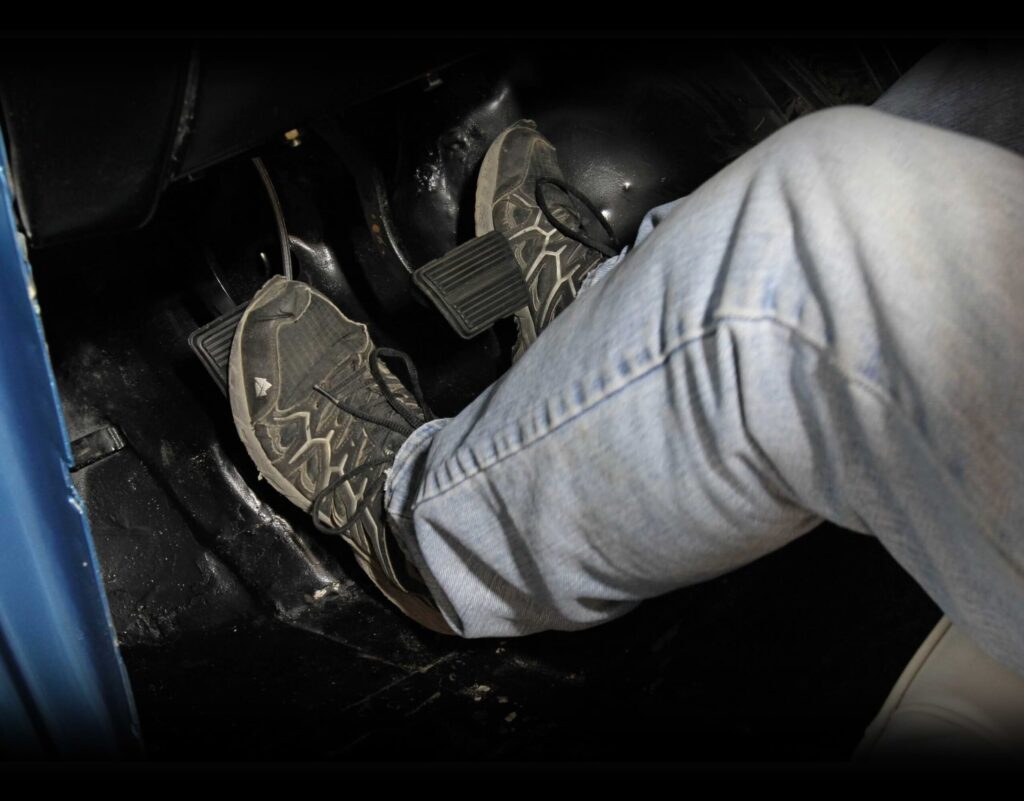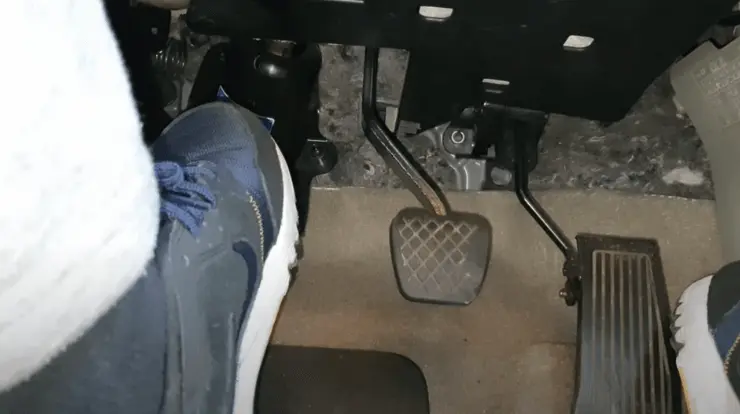You can drive a bit with a squeaky clutch, but it’s important to fix it soon. The squeak usually means there’s a problem, like not enough oil or worn-out parts. Even though you might manage to drive for a short while, not fixing it can cause bigger issues with how your car works.
It’s best to ask a mechanic for help as soon as you can. If you wait too long, the problem could get worse, and your car might stop working well. Taking care of the squeak early on helps keep your driving safe and your car in good shape.
What Causes a Squeaky Clutch?

A squeaky clutch can be caused by a lack of lubrication between moving parts, leading to friction and noise. Additionally, worn-out components or other factors like misalignment or foreign objects in the clutch assembly can contribute to the squeaking sound
Potential Reasons Behind a Squeaky Clutch
Lack of Lubrication
A squeaky clutch can often result from insufficient lubrication between the moving parts. The absence or shortage of lubricating fluids causes friction, leading to the squeaking noise.
Worn-out Components
Wear and tear on various clutch components, including the clutch disc or pressure plate, can cause squeaking. As these parts degrade, the surfaces may rub against each other, producing the unwanted noise.
Other Possible Factors
Several additional factors can contribute to a squeaky clutch, such as misalignment, foreign objects, or damage to the clutch linkage. These issues can exacerbate friction and result in the characteristic noise.
Importance of Diagnosing the Root Cause
Early Detection Prevents Further Damage
Identifying the specific cause of the squeaky clutch is crucial to prevent further damage. Early detection allows for timely intervention and can save you from more extensive and costly repairs down the road.
Preservation of Clutch System Integrity
Diagnosing the root cause ensures the overall health of the clutch system. Addressing issues promptly helps maintain the integrity of clutch components, extending their lifespan and sustaining optimal performance.
Enhanced Safety and Performance
Knowing why the clutch is squeaking contributes to safer driving. A well-maintained clutch system enhances overall vehicle performance and reduces the risk of unexpected breakdowns.
Is it Safe to Drive With a Squeaky Clutch?
No, it’s not safe to drive with a squeaky clutch, as it suggests potential problems affecting your car’s performance and could lead to difficulties in shifting gears. Addressing the issue promptly is essential for a safer and smoother driving experience.
Addressing Safety Concerns
Impact on Overall Vehicle Performance
A squeaky clutch may indicate underlying issues that can impact the overall performance of your vehicle. The noise might be a symptom of reduced efficiency in the clutch mechanism, potentially leading to difficulty in shifting gears smoothly.
Continued driving under such conditions can compromise the drivability of your car, affecting your ability to control and operate it safely.
Potential Long-term Damage
Ignoring a squeaky clutch can result in long-term damage to critical components. The friction causing the noise may lead to increased wear on the clutch parts, potentially causing them to fail. Driving with a compromised clutch for an extended period can escalate repair costs and, in severe cases, result in a complete breakdown, leaving you stranded.
Importance of Addressing the Issue Promptly
Preventing Safety Hazards
Diagnosing and fixing a squeaky clutch promptly is crucial to prevent safety hazards on the road. A compromised clutch can lead to unexpected stalls, especially during gear shifts, posing a risk to you and other drivers.
Avoiding Costly Repairs
Timely attention to a squeaky clutch helps address the root cause before it escalates into more significant and costly issues.
Early intervention can often involve simple repairs or component replacements, preventing the need for extensive and expensive repairs later.
Sustaining Vehicle Reliability
Prompt action ensures the continued reliability of your vehicle. A well-maintained clutch system contributes to the smooth operation of your car, reducing the likelihood of breakdowns and ensuring a safer and more enjoyable driving experience.
How Long Can You Safely Drive With a Squeaky Clutch?

The safe duration for driving with a squeaky clutch can vary based on factors like the frequency and severity of the noise. If the squeak is occasional and not too pronounced, it might be safe to drive for a short period.
However, if the noise is persistent or if you notice changes in the clutch’s performance, it’s advisable to seek professional assistance promptly.
Consideration of driving conditions is crucial. If you’re mostly driving in stop-and-go traffic or hilly terrains, the strain on the clutch system may be higher, potentially requiring quicker attention to prevent further damage.
Warning Signs that Indicate Immediate Attention is Required
If you experience changes in how the clutch pedal feels, such as increased resistance or a difference in engagement, it’s a warning sign that immediate attention is needed. These changes may indicate a more serious issue requiring prompt inspection and repair.
The presence of a burning smell or smoke while driving with a squeaky clutch is a red flag. It suggests excessive friction and potential overheating of clutch components. Continuing to drive in such conditions can lead to severe damage, necessitating urgent intervention.
If you encounter difficulties or resistance while shifting gears, it indicates a compromised clutch system. This warning sign requires immediate attention to prevent further strain on the transmission and associated components.
DIY Solutions and Quick Fixes
Use the Right Oil
Put the right slippery stuff (oil made for cars) on the moving parts of your clutch. This helps stop small squeaks by making things slide better and not rub too much.
Fix How the Pedal Moves
If your clutch pedal moves too much or not enough, adjust it a bit. Sometimes, this can help with small squeaks by making things fit better.
Check for Loose Parts
Look at your clutch parts. If something looks loose, tighten it. This can sometimes stop small squeaks. But be careful not to make it too tight!
Stop for a Pro Check
DIY fixes are like quick Band-Aids. They can help for a bit, but they don’t really fix the big problem. If the squeak doesn’t go away or comes back, it’s time for a car doctor (a mechanic) to check and really fix it.
Watch and Check
After you try a quick fix, keep an eye on your car. If the squeak doesn’t stay away, it means something else might be wrong. Don’t wait too long—go see the car doctor to make sure everything is okay.
Let the Car Doctor Fix It Right
DIY fixes are good to try, but for a real fix, let the car doctor look at your car. They can find what’s really wrong and make sure your car works well for a long time.
When to Get Help from a Car Expert?
If the squeaky noise in your car doesn’t go away, or if you notice changes in how your car behaves, like difficulty driving or strange smells, it’s time to ask a car expert, known as a mechanic, for help. They know how to find and fix problems to keep your car in good shape.
Signs that the Issue Needs a Pro
Persistent Squeaking
If the squeaky sound doesn’t go away, especially after trying simple fixes, it’s time to ask a car expert for help. They can figure out what’s causing the problem.
Changes in How Your Car Acts
If your car starts acting differently, like being hard to drive or if the gears feel strange, a car expert can find out why. They know how to make cars healthy again.
Strange Smells or Smoke
If you smell something burning or see smoke, it’s a big sign that something’s not right. A car expert can check and fix it before it becomes a bigger problem.
Why a Car Doctor (Mechanic) is Important
Car doctors, or mechanics, are experts in cars. They know all the parts and how they work. If something is wrong, they can find it and fix it.
When you’re not sure what’s making your car sick, a car doctor can do a full checkup. They’ll look at everything to find the real problem and fix it from the root.
Going to a car doctor even when things seem small is important. It’s like going to the doctor when you feel a bit sick. They can make sure your car stays healthy and doesn’t get sicker.
FAQ
How long will a noisy clutch release bearing last?
If your clutch release bearing is making noise, it’s best to see a mechanic soon. Driving with the noise might cause more damage, and fixing it early is a good idea to avoid bigger problems.
What to do with a squeaky clutch?
When your clutch makes a squeaky sound, try simple fixes like adding the right oil. But remember, these are temporary. Ask a mechanic for help to find and fix the real problem.
Can I drive with clutch bearing noise?
Yes, you can drive a bit, but it’s not good for a long time. The noise may mean a problem, so it’s better to see a mechanic soon to prevent more issues.
What is the lifespan of a clutch bearing?
A clutch bearing can last 50,000 to 100,000 miles. But it’s important to check and replace it as needed to make sure your car stays in good shape.
What are the signs of a bad clutch?
If your clutch is bad, you might notice slipping gears, trouble shifting, or strange smells. If you see or feel these things, it’s time to ask a mechanic for help.
How do I know my clutch is bad?
A bad clutch can show itself with slipping gears, trouble shifting, or weird noises. If your clutch pedal feels different, like harder to press, it could be a sign of a problem. Ask a mechanic to check it out.
What are the first signs of clutch failure?
The first signs of clutch trouble include slipping gears, trouble shifting, and strange noises. If you notice these things, it’s important to get your car checked by a mechanic.
Is it OK to drive with a bad clutch?
Yes, you can drive a bit with a bad clutch, but it’s not safe for long. Driving with a bad clutch can cause more damage. Get it checked by a mechanic to keep your car working well.
How do I know if I need a new clutch?
If DIY fixes don’t help and you still have problems like slipping gears or strange noises, it’s time to see a mechanic. They can check if you need a new clutch and fix it for you.
Final thoughts
Driving with a squeaky clutch is not ideal for your car’s health. It’s safest to address the issue early on by consulting a mechanic, ensuring a smoother and more reliable driving experience in the long run. Remember, taking care of your squeaky clutch promptly is like giving your car a little TLC to keep it running smoothly.

